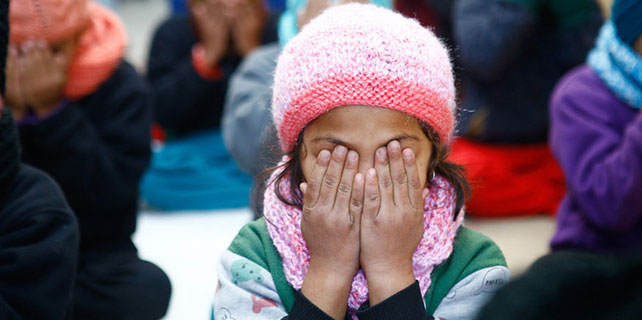Right to development is fundamental
National Development Strategies
The world is a colorful place, with many different development patterns. Summarizing its historical experience and based on its prevailing conditions, China has chosen a socialist path. It strives to build socialism with Chinese characteristics, create a beautiful life for the Chinese people, and realize the people's right to development.
To build socialism with Chinese characteristics, China sets its national development strategies based on the need to protect and realize its people's right to development. In the early 1980s, the CPC proposed the "three-step" development strategy: First, to double the 1981 GNP and ensure the provision of basic material needs by 1990; second, to double the 1991 GNP by the end of the 20th century and bring people's living standards to a level of "reasonable prosperity"; and third, to quadruple that new GNP to the level of moderately developed countries by the mid-21st century, and bring the Chinese people an affluent life.
At the 15th CPC National Congress in 1997, the third step was made more specific, and a new "three-step" strategy for the first half of the 21st century was put forward. First, in the first decade of the 21st century, to double GNP compared to the 2000 level, raise levels of prosperity, and form a relatively complete socialist market economy; second, with ten more years' hard work, to further develop the economy and improve various institutions by the centenary of the founding of the CPC; and third, to achieve basic modernization and complete the building of a socialist country that is prosperous, democratic, and culturally advanced by the centenary of the founding of the People's Republic of China in the mid-21st century.
After entering the 21st century, the CPC set itself the strategic task of building a "moderately prosperous society in all respects." Since the 18th CPC National Congress in 2012, the Party's Central Committee, with Xi Jinping as its core, has set the "people's wish for a better life" as its goal of governance, and defined the Two Centenary Goals. That is, to enable the people to live prosperous lives and complete the building of a moderately prosperous society in all respects by 2020, the centenary of the CPC (founded in 1921), and to bring China's per capita GDP on par with that of moderately developed countries, and build China into a modern socialist country that is prosperous, strong, democratic, culturally advanced, and harmonious by the centenary of the PRC (founded in 1949) in the mid-21st century.
To achieve the Two Centenary Goals, the CPC strives to promote coordinated progress in economic, political, cultural, social, and ecological areas, and to implement the Four-pronged Comprehensive Strategy, viz., building a moderately prosperous society in all respects, driving reform to a deeper-level, fully implementing the rule of law, and strengthening Party discipline. Based on economic growth, the Party will continue to build the socialist market economy, promote democracy, advanced culture, ecological progress, and a harmonious society, and ensure that the people are better-off, that the nation grows stronger and more prosperous, and that the environment is clean and beautiful, and that the people's right to development is protected and promoted in a more solid and effective manner.
Overall Development Plans
In accordance with the goal to build a modern socialist country and the associated development strategies, the Chinese government regularly makes national development plans to ensure the people's right to development. In the period between 1953 and 2001, it issued national development plans every five years addressing issues concerning the country's economy, culture, and society. After 2006 the plan has been changed to program which is less detailed, with fewer numerical targets to guide the macro-economy and social development. To date China has made 13 consecutive five-year plans (including the program starting from 2016) for the nation's economic and social development. These plans have connected the country's overall development goals to the concrete plans to implement them, and are divided into different stages to steadily promote the people's right to development, with mid-and long-term guidelines, goals and directions, basic requirements, and specific measures.
On October 29, 2015, the Fifth Plenary Session of the 18th CPC Central Committee approved the "Suggestions of the CPC Central Committee on Developing the 13th Five-Year Program for National Economic and Social Development." On March 16, 2016, the Fourth Session of the 12th National People's Congress approved by vote the "Outline of the 13th Five-Year Development Program of the People's Republic of China for National Economic and Social Development." Following the new philosophies on development and based on universal participation and benefits, China stresses equal opportunities, with an emphasis on ensuring basic living standards, improving the people's wellbeing, and realizing a moderately prosperous society for all the people. China has made breakthroughs in equal access to the fruits of development, mainly in increasing the supply of public services, carrying out poverty eradication programs, enhancing the quality of education, granting equal access to educational resources, promoting employment and entrepreneurship, bridging the income gap, establishing a fairer and more sustainable social security system, enhancing public health and fitness, and strengthening the balanced development of the people.
China ensures its people's right to development also by making national human rights action plans. It has issued the "National Human Rights Action Plan" (2009-2010), (2012-2015), and (2016-2020). In these plans, the government puts the people's right to development at the core of human rights, and strives to address the most immediate problems that are of the most concern to the public. While promoting the sound and rapid development of the economy and society, China ensures that all members of the society enjoy the rights to equal participation and equal development.









